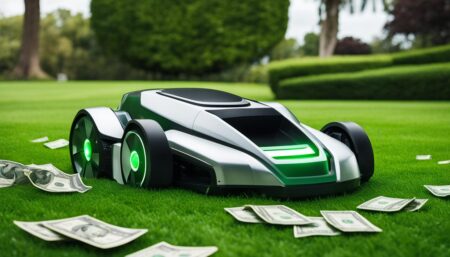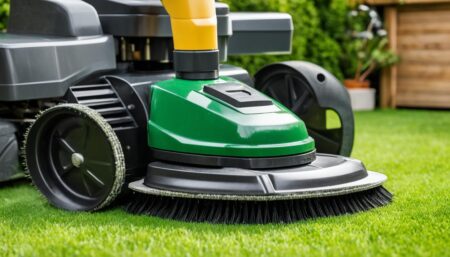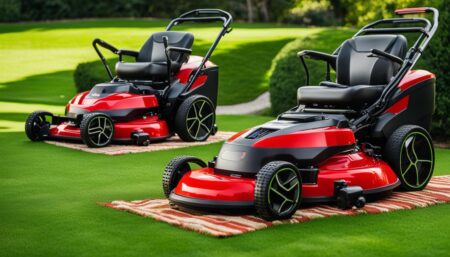When it comes to maintaining a well-manicured lawn, homeowners have two main options: robotic lawn mowers and traditional lawn mowers. Both have their advantages and it can be challenging to decide which one is the best choice for your needs. In this article, we will compare the benefits of robot mowers and the advantages of traditional mowers, helping you make an informed decision.
Robotic lawn mowers are becoming increasingly popular due to their ability to optimize time, reduce manual labor, and automate repetitive tasks. These autonomous machines can cut grass without human involvement, utilizing sensors and navigation systems. They are powered by rechargeable batteries and can operate without the need for a perimeter wire. On the other hand, traditional lawn mowers have been around for longer and offer a wide range of options for different lawn sizes and terrains. Whether you opt for a push mower, a riding mower, or a gasoline-powered or electric mower, traditional mowers have been a common choice for many homeowners.
In the following sections, we will delve deeper into the specifics of robotic lawn mowers and traditional lawn mowers. We will explore the benefits of using a robotic lawn mower, the advantages of traditional lawn mowers, their impact on the environment, safety features, and durability. Lastly, we will provide you with essential factors to consider when choosing between these two options, along with a real-life case study that showcases the differences. Let’s get started!
Key Takeaways:
- Robotic lawn mowers offer convenience and time-saving benefits.
- Traditional lawn mowers provide a wide variety of options and are more affordable.
- Robotic mowers contribute to a greener environment with their eco-friendly operations.
- Traditional mowers are durable and have simpler mechanisms for maintenance.
- Consider factors such as lawn size, convenience, precision, environmental impact, budget, safety, and personal preferences when choosing between robot and traditional mowers.
+
What Are Robotic Lawn Mowers?
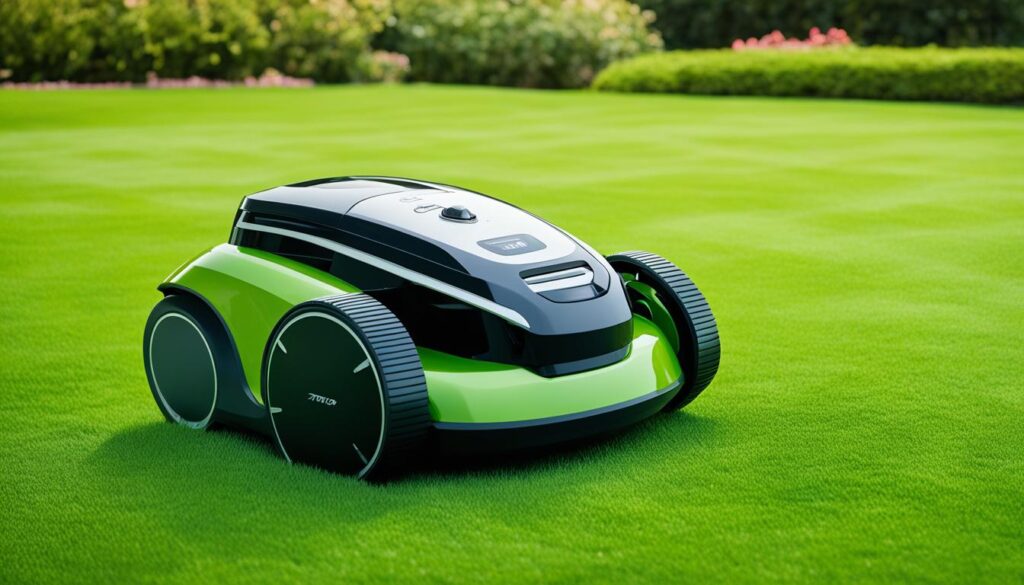
Robotic lawn mowers are autonomous machines specifically designed to maintain your lawn without requiring human intervention. These innovative devices utilize advanced sensors and navigation systems, such as GPS or Bluetooth, to identify the areas that need to be mowed while avoiding obstacles along the way. Powered by rechargeable batteries, robotic lawn mowers are capable of returning to their charging stations automatically when they need to recharge. Modern models have evolved to eliminate the need for a perimeter wire, instead relying on GPS coordinates and vision technology to stay within the mapped boundaries of your lawn.
Robotic lawn mowers provide a hassle-free solution for maintaining your lawn, allowing you to reclaim your time and enjoy a well-manicured lawn without the physical exertion.
These autonomous machines are equipped with a range of sensors, including boundary sensors to detect the edges of your lawn, rain sensors to pause operation during inclement weather, and lift sensors to halt the blades if the mower is lifted off the ground. Additionally, they employ navigation systems that enable them to maneuver around your lawn efficiently while avoiding flowers, trees, and other obstacles.
Robotic lawn mowers are environmentally friendly, as they emit zero harmful emissions during operation. Their quiet operation minimizes noise pollution, allowing you to mow your lawn without disrupting your neighbors or disturbing the peace. Furthermore, their efficient cutting patterns promote healthier grass growth, reducing the need for excessive watering and the use of chemicals.
What Are Traditional Lawnmowers?
Traditional lawnmowers, also known as push mowers or riding mowers, have been the common choice for many homeowners. They require manual operation and use either gasoline or electric power. Gasoline-powered mowers are more powerful and suitable for larger yards but emit greenhouse gases and are noisy. Electric mowers, either cordless battery-powered or corded, are quieter and more eco-friendly but may have limitations in terms of power and cutting capacity.
Benefits of Using a Robotic Lawnmower
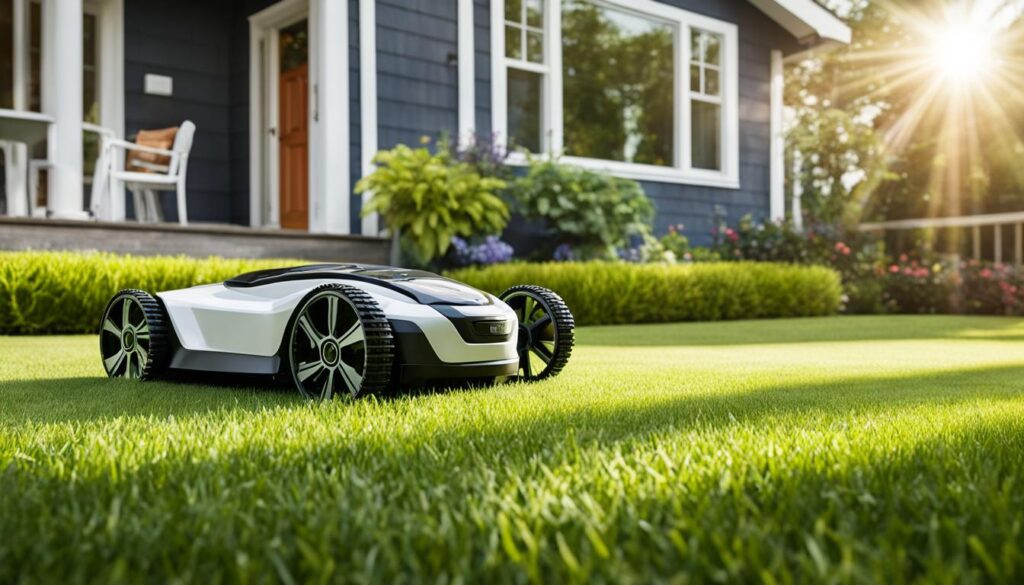
Robotic lawnmowers offer a multitude of benefits over traditional mowers, making them an excellent choice for homeowners seeking convenience, efficiency, and sustainability. Let’s explore some of the key advantages of using a robotic lawnmower:
Flexibility
One of the standout features of robotic lawnmowers is their flexibility. These autonomous machines can be programmed to follow specific schedules and mow at predetermined times. Whether you prefer a weekly mowing routine or want your lawn trimmed every few days, a robotic lawnmower can adapt to your needs, ensuring your lawn always looks pristine.
Reliability
Robotic lawnmowers are designed with built-in safety features and advanced navigation systems, ensuring reliable and efficient operation. These machines are equipped with sensors to detect obstacles, preventing collisions and damage to both the mower and your lawn. Additionally, most robotic lawnmowers are capable of navigating complex terrains, including slopes and uneven surfaces, providing consistent performance.
Less Maintenance
When it comes to maintenance, robotic lawnmowers excel. Unlike traditional mowers that require regular oil changes, spark plug replacements, and air filter cleanings, robotic lawnmowers eliminate these time-consuming tasks. With their electric power source, they do not require any fuel or oil, reducing both maintenance efforts and costs.
Eco-friendly
Robotic lawnmowers are environmentally friendly alternatives to traditional mowers. They run on rechargeable batteries, producing zero emissions during operation. This eco-friendly approach reduces air pollution and contributes to a cleaner and healthier environment for everyone.
Convenience
Perhaps the most significant benefit of using a robotic lawnmower is the convenience it offers. By taking care of the mowing task autonomously, these machines free up your time and energy. You can spend more leisure time with your loved ones or engage in activities you enjoy, knowing that your lawn is being meticulously maintained by your trusty robotic helper.
With their flexibility, reliability, safety, minimal maintenance needs, eco-friendliness, and convenience, robotic lawnmowers are revolutionizing the way we maintain our lawns. Let these smart machines take care of the hard work while you enjoy a beautifully manicured lawn and more time for yourself.
Advantages of Traditional Lawn Mowers
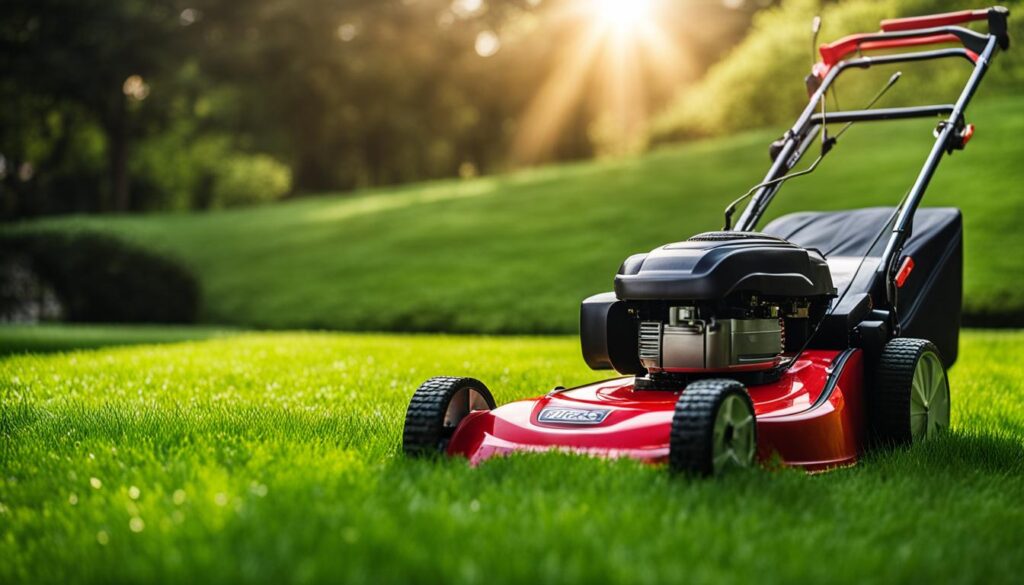
Traditional lawn mowers have their own set of advantages that make them a popular choice for many homeowners. Here are some of the key benefits:
- Variety of Options: Traditional mowers offer a wide range of options to suit different lawn sizes and terrains. Whether you have a small yard or a large lawn with uneven terrain, there are traditional mowers available to meet your specific needs.
- Lower Initial Cost: In comparison to robotic mowers, traditional mowers generally have a lower initial cost. This makes them more accessible and budget-friendly for a wide range of homeowners.
- Easier Maintenance: Traditional mowers typically have simpler mechanisms and easier maintenance requirements. From routine maintenance tasks such as oil changes and blade sharpening to more complex repairs, traditional mowers are generally easier to maintain. Replacement parts are readily available, making repairs convenient.
- Suitability for Larger Lawns: If you have a larger lawn that requires more power and cutting capacity, traditional mowers are a suitable choice. They offer the necessary strength and performance to efficiently maintain expansive lawns.
With their variety of options, lower initial cost, easier maintenance, and suitability for larger lawns, traditional lawn mowers remain a popular choice among homeowners.
Quotable:
Traditional mowers offer a wide range of options, lower initial cost, easier maintenance, and suitability for larger lawns.
Robotic Lawn Mowers and the Environment
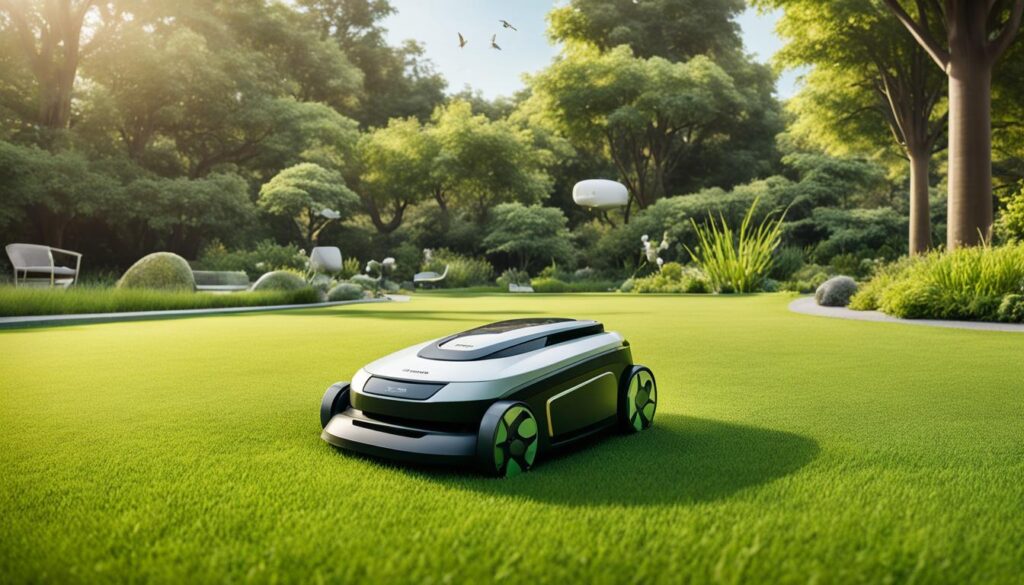
Robotic lawn mowers have revolutionized the way we care for our lawns, offering both convenience and environmental benefits. These autonomous machines not only make our lives easier but also contribute to sustainable practices.
One of the significant advantages of robotic lawn mowers is their lower emissions compared to traditional mowers. Powered by rechargeable batteries, they operate on electric power, eliminating the need for gasoline and reducing harmful emissions. This not only helps to improve air quality but also contributes to a cleaner and greener environment.
“Robotic lawn mowers run on electric power, reducing emissions and contributing to cleaner air.”
In addition, robotic mowers operate quietly, minimizing noise pollution in residential areas. Unlike traditional mowers, which can produce loud and disruptive noise levels, robotic mowers provide a quieter operation, allowing homeowners and their neighbors to enjoy a peaceful outdoor environment.
Furthermore, robotic mowers promote sustainable practices by reducing water consumption. These machines utilize precise mowing patterns, continuously trimming small amounts of grass while leaving the clippings in place. As a result, the grass clippings act as natural mulch and contribute to the soil’s health, reducing the need for excessive watering and potential chemical treatments.
Robotic lawn mowers align with the increasing demand for sustainable and environmentally friendly lawn maintenance options. By reducing emissions, operating quietly, and promoting reduced water consumption, they help to create a healthier planet and a more sustainable future.
Safety and Durability Comparison
When it comes to safety and durability, robotic mowers and traditional mowers have their own strengths and considerations.
Robotic Mowers’ Safety Features
Robotic mowers prioritize safety with their built-in sensors and automatic adjustments to avoid obstacles. These mowers are equipped with advanced navigation systems, allowing them to detect and navigate around objects in their path. Additionally, lift and tilt sensors are incorporated to prevent accidents when the mower is lifted or tilted. These safety features provide peace of mind knowing that the mower will operate safely in your yard.
Traditional Mower Safety Considerations
Traditional mowers also have safety features in place; however, they rely on manual operation and user adherence to safety guidelines. It is important to pay close attention to the machine’s safety mechanisms and follow recommended usage practices to avoid accidents. While traditional mowers can be operated safely, they require responsible handling and care.
Durability of Robotic Mowers
Robotic mowers are specifically designed to withstand outdoor elements and operate reliably for extended periods. They are built to be durable and can handle various weather conditions such as rain, heat, and even cold temperatures. Their construction is intended to protect sensitive components from moisture and ensure continued performance throughout the mowing season.
Durability and Maintenance for Traditional Mowers
The durability of traditional mowers can vary depending on the make and model. Some models are built with sturdier materials and components that enhance their durability, while others may require more frequent maintenance or replacement of parts. It is important to follow the manufacturer’s maintenance guidelines to ensure that the traditional mower remains in good working condition. Regular maintenance tasks may include oil changes, blade sharpening, and air filter cleaning or replacement.
Comparing Safety and Durability
In terms of safety, robotic mowers have the advantage with their automatic obstacle detection and lift/tilt sensors. Traditional mowers also have safety features, but their reliance on manual operation adds an extra layer of responsibility for the user. When it comes to durability, robotic mowers are designed to withstand outdoor conditions and offer reliable performance. Traditional mowers’ durability can vary, but proper maintenance and adherence to usage guidelines are necessary to ensure their longevity.
As you consider the safety and durability aspects of lawn mowers, it’s important to evaluate your specific needs and preferences. Choose a mower that provides the safety features and durability that align with your lawn care requirements and maintenance capabilities.
Factors to Consider When Choosing Between Robotic and Traditional Mowers
When it comes to choosing between robotic and traditional mowers, several factors need to be taken into consideration. To make an informed decision that aligns with your needs and preferences, consider the following:
Lawn Size and Complexity
The size and complexity of your lawn play a crucial role in determining the suitability of each mower type. Robotic mowers are well-suited for small to medium-sized lawns with relatively simple layouts. In contrast, traditional mowers, such as riding mowers, are better equipped to handle larger lawns with complex terrains and obstacles.
Convenience and Time
Convenience and time-saving capabilities are essential considerations. Robotic mowers provide unmatched convenience, as they operate autonomously without any manual effort required. They can be programmed to mow your lawn at specified times and can even return to their charging stations when the battery is low. Traditional mowers, on the other hand, rely on manual operation, which can be time-consuming and physically demanding.
Precision and Consistency
A well-maintained lawn requires precision and consistency in cutting. Robotic mowers excel in this aspect, as they follow programmed patterns and cutting heights with exceptional accuracy. This results in an evenly trimmed lawn with a professional finish. Traditional mowers can achieve good results as well, but they may require more manual adjustment and attention to detail.
Environmental Impact
Considering the environmental impact of your choice is crucial. Robotic mowers are more eco-friendly, as they run on electric power and produce zero emissions. They operate quietly, minimizing noise pollution, and their precise cutting patterns promote healthier grass, reducing the need for excessive watering and harmful chemical treatments. Traditional mowers, especially gasoline-powered models, emit greenhouse gases and contribute to air and noise pollution.
Budget and Maintenance
Both budget and ongoing maintenance requirements should be taken into account. Robotic mowers typically have a higher upfront cost compared to traditional mowers, primarily due to their advanced technology. However, they require less ongoing maintenance, as they don’t need oil changes, spark plug replacements, or blade sharpening. Traditional mowers may have a lower initial cost but often require more frequent maintenance and replacement of parts.
Safety Considerations
Safety should always be a priority when choosing a mower. Robotic mowers are equipped with built-in safety features, such as collision sensors and automatic shut-offs when lifted or tilted. They also reduce the risk of injury associated with manual operation. Traditional mowers have safety features as well, but the responsibility for safe operation lies with the user, requiring adherence to safety guidelines and precautions.
Personal Preferences
Ultimately, personal preferences play a significant role in the decision-making process. Some individuals may enjoy the satisfaction and physical activity that comes with using a traditional mower. Others may prioritize the convenience and time-saving benefits offered by robotic mowers. Consider your preferences for hands-on involvement, interaction with technology, and the overall experience when making your choice.
Support and Servicing
Consider the availability of support and servicing for both types of mowers. Robotic mowers often require specialized maintenance and repairs, which may require accessing authorized service centers or contacting manufacturer support. Traditional mowers, especially those from popular brands, tend to have a wider network of service providers and readily available replacement parts.
Case Study: Robotic Mowers vs Traditional Mowers
A case study comparing robotic mowers and traditional mowers revealed the clear difference in lawn appearance and maintenance. The precision and consistency of robotic mowed lawns were evident, with even cutting heights and patterns. In contrast, lawns mowed with traditional mowers showed variations in grass height, bare spots, and uneven cutting.
Pictures showcased the benefits of using robotic mowers in achieving a perfectly manicured lawn.
Robotic mowers offer a level of precision that ensures a uniform and flawless appearance. They consistently maintain the desired cutting height and follow a predetermined pattern, resulting in an aesthetically pleasing lawn. On the other hand, traditional mowers may struggle to deliver the same level of precision and consistency, leaving behind uneven patches and an inconsistent overall look.
Moreover, the case study revealed that neighbor’s lawns maintained with robotic mowers appeared better tended and visually appealing, attracting positive attention from others in the community.
Conclusion
In conclusion, when it comes to choosing between a robot and a traditional lawnmower, there are several factors to consider. Robotic mowers offer a range of benefits including flexibility, reliability, safety, less maintenance, eco-friendliness, and convenience. They can be programmed to mow the lawn at specific times, reducing the need for manual labor. They are equipped with sensors to navigate around obstacles and automatic adjustments to ensure safety. Robotic mowers also require minimal maintenance and run on rechargeable batteries, making them more eco-friendly.
On the other hand, traditional lawnmowers have their advantages as well. They provide a variety of options to suit different lawn sizes and terrains. They generally have a lower initial cost compared to robotic mowers, making them more accessible to a wider range of homeowners. Additionally, traditional mowers can be easier to maintain and repair as they have simpler mechanisms and readily available replacement parts. They are also more suitable for larger lawns that may require more power and cutting capacity.
Ultimately, the best choice between a robot and a traditional lawnmower depends on individual needs and priorities. If convenience, eco-friendliness, and a well-maintained lawn are the top concerns, a robotic mower may be the best choice. However, if affordability, versatility, and familiarity are more important, a traditional mower may be the preferred option. It is essential to consider factors such as lawn size, desired precision, environmental impact, maintenance requirements, budget, and personal preferences when making this decision. By weighing these factors, homeowners can make an informed choice that suits their specific needs.
FAQ
What is the difference between robotic and traditional lawnmowers?
Robotic lawnmowers are automated machines that cut grass without human involvement, using sensors and navigation systems. They are powered by rechargeable batteries and can operate without the need for a perimeter wire. Traditional lawnmowers, on the other hand, require manual operation and use either gasoline or electric power.
What are the advantages of using a robotic lawnmower?
Robotic lawnmowers offer flexibility through programmable schedules and customizable mowing settings. They are reliable with built-in safety features and navigation systems. They require less maintenance as they don’t need oil changes or spark plug replacements. They are eco-friendly, running on batteries and producing no emissions. They offer convenience by eliminating the need for manual labor and allowing users to enjoy their free time.
What are the advantages of using a traditional lawnmower?
Traditional lawnmowers offer a wide variety of options to suit different lawn sizes and terrains. They generally have a lower initial cost compared to robotic mowers and are more accessible to a wider range of homeowners. Maintenance and repairs are often easier with traditional mowers, as they have simpler mechanisms and readily available replacement parts. They are more suitable for larger lawns that may require more power and cutting capacity.
How do robotic lawnmowers impact the environment?
Robotic lawnmowers have a positive impact on the environment compared to traditional mowers. They run on electric power, reducing emissions and contributing to cleaner air. They operate quietly, minimizing noise pollution. Their precise mowing patterns promote healthier grass, reducing the need for excessive watering and potential chemical treatments. They align with sustainable practices and contribute to a greener future.
Are robotic lawnmowers safer and more durable than traditional mowers?
Robotic lawnmowers prioritize safety with built-in sensors and automatic adjustments to avoid obstacles. They also have lift and tilt sensors to prevent accidents when lifted or tilted. Traditional mowers have safety features as well but require manual operation and user adherence to safety guidelines. In terms of durability, robotic mowers are designed to withstand outdoor elements and operate reliably for extended periods. Traditional mowers’ durability can vary depending on the make and model but often require regular maintenance.
What factors should I consider when choosing between robotic and traditional lawnmowers?
When choosing between robotic and traditional mowers, consider factors such as lawn size and complexity, convenience and time, precision and consistency, environmental impact, budget and maintenance, safety considerations, personal preferences, and the availability of support and servicing.
Is there any case study comparing robotic mowers and traditional mowers?
Yes, a case study comparing robotic mowers and traditional mowers revealed the clear difference in lawn appearance and maintenance. The precision and consistency of robotic mowed lawns were evident, with even cutting heights and patterns. In contrast, lawns mowed with traditional mowers showed variations in grass height, bare spots, and uneven cutting. Pictures showcased the benefits of using robotic mowers in achieving a perfectly manicured lawn.




